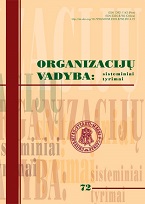Teoriniai tarpvyriausybinio valdžios funkcijų paskirstymo principai
Theoretical principles of intergovernmental assignment of public functions
Author(s): Gerda ŽigienėSubject(s): Economy
Published by: Vytauto Didžiojo Universitetas
Keywords: Valstybės funkcijos; Tarpvyriausybinis funkcijų paskirstymas; Devoliucija; Delegavimas Public functions; Intergovernmental assignment of functions; Devolution; Delegation
Summary/Abstract: Straipsnyje pateikiami teoriniai valstybės funkcijų padalijimo tarp skirtingų valdžios lygių aspektai. Decentralizacijos procesas, kuris plačiąja prasme gali būti apibrėžiamas kaip valdžios funkcijų perdavimas iš centrinės valdžios atsakomybės regioninei arba vietos valdžiai, kelia klausimą, kokios valstybės funkcijos turi likti centrinės valdžios rankose, o kokios gali būti perduotos žemesnėms valdymo grandims, bei kokios gali būti dalijamos tarp valdžios lygmenų? Nors nėra vieningo valdžios funkcijų paskirstymo modelio, tinkančio visoms sistemoms ir visiems laikotarpiams, skiriami pagrindiniai principai ir kriterijai, kurių svarbu paisyti ypač pereinamojo laikotarpio ekonomikos šalyse. This paper focuses on the theoretical background of functions assignment between different levels of government. Decentralisation process in its broader concept means the release of central government power, transferring the responsibility and implementation of some public functions to the lower government tiers. This process raises many issues related to the state authority division: which of the functions should remain in the hands of central government and which should be devolved to the lower levels, and finally, which functions should be shared between different levels of government. In every decentralizing country questions about tax power and expenditure responsibility have to be answered. If the functions are divided in the proper way, the amount of expenditures for functions performance as well as the need for tax income to be collected to fund expenditures becomes evident. Therefore the allocation of financial resources and fiscal transfers must be carried out only after a distinct allocation of roles and responsibilities to different levels of government. The paper starts with the explanation of Musgrave’s three main functions of state in market economy. This conceptual allocation of state duties helps to determine the place of functions, costs and tax income. While the macroeconomic stabilisation and income distribution in general are assigned to the central level, Fiscal federalism model provides resource allocation to sub national government with an important role. For the sake of objective it should be noted that while many contemporary authors in principle agree with the above stated division, some have the opposite opinion which is outlined in the paper next to the each function.
Journal: Organizacijų vadyba: sisteminiai tyrimai
- Issue Year: 2014
- Issue No: 72
- Page Range: 131-136
- Page Count: 6
- Language: Lithuanian

